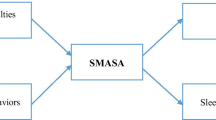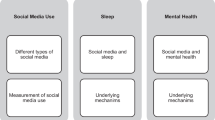Abstract
Purpose
How cancer history and distress relate to sleep outcomes of adolescents and young adults (AYAs) is unclear. The current study compares AYA cancer survivors to controls on indicators of sleep and fatigue; examines the concurrent association between psychological status, sleep, and fatigue; and investigates the lagged relationship between sleep and fatigue problems with psychological functioning.
Methods
AYA cancer survivors (n = 167) and controls (n = 170), ages 16 to 30, completed measures at a survivorship clinic/primary care visit (time 1) and 2 months later (time 2). Participants completed questions about sleep quality, quantity, sleep medication use, self-reports of sleep problems, and fatigue in addition to measures of depression, anxiety, and posttraumatic stress symptoms (PTSS).
Results
There were no differences in sleep quantity or quality between survivors and controls, but survivors reported significantly more fatigue. Within groups, AYAs with self-reported sleep and fatigue problems reported significantly higher depression, anxiety, and PTS symptoms. Controlling for baseline depression, sleep, and fatigue problems at time 1 significantly predicted depression at time 2 in survivors but not in controls.
Conclusion
This study offers important insight into the psychological functioning of childhood cancer survivors and prospectively describes sleep and fatigue as risk factors for poor psychological functioning in survivors. These findings support screening for sleep problems in AYA survivors as these difficulties are closely related to mental health functioning.
Similar content being viewed by others
References
Lee K, Cho M, Miaskowski C, Dodd M (2004) Impaired sleep and rhythms in persons with cancer. Sleep Med Rev 8(3):199–212
Meeske KA, Patel SK, Palmer SN, Nelson MB, Parow AM (2007) Factors associated with health-related quality of life in pediatric cancer survivors. Pediatr Blood Cancer 49(3):298–305. doi:10.1002/pbc.20923
Meeske KA, Siegel SE, Globe DR, Mack WJ, Bernstein L (2005) Prevalence and correlates of fatigue in long-term survivors of childhood leukemia. J Clin Oncol 23(24):5501–5510
Zeltzer LK, Recklitis C, Buchbinder D, Zebrack B, Casillas J, Tsao JC et al (2009) Psychological status in childhood cancer survivors: a report from the childhood cancer survivor study. J Clin Oncol 27(14):2396–2404
Daniel LC, Brumley LD, Schwartz LA (2013) Fatigue in adolescents with cancer compared to healthy adolescents. Pediatr Blood Cancer 60(11):1902–1907
Cella D, Peterman A, Passik S, Jacobsen P, Breitbart W (1998) Progress toward guidelines for the management of fatigue. Oncology 12(11A):369–377
Ancoli-Israel S, Moore PJ, Jones V (2001) The relationship between fatigue and sleep in cancer patients: a review. Europ J Cancer Care 10(4):245–255
Carskadon MA, Mindell J, Drake C (2006) Contemporary sleep patterns of adolescents in the USA: results of the 2006 National Sleep Foundation Sleep in America Poll. Journal of Sleep Research. England Blackwell Publishing, Oxon, p 42
Millman RP (2005) Excessive sleepiness in adolescents and young adults: causes, consequences, and treatment strategies. Pediatrics 115(6):1774–1786
Carskadon MA (1990) Patterns of sleep and sleepiness in adolescents. Pediatrician 17(1):5–12
Gordijn MS, van Litsenburg RR, Gemke RJ, Huisman J, Bierings MB, Hoogerbrugge PM et al (2013) Sleep, fatigue, depression, and quality of life in survivors of childhood acute lymphoblastic leukemia. Pediatr Blood Cancer 60(3):479–485
Zhou ES, Recklitis CJ (2014) Insomnia in adult survivors of childhood cancer: a report from project REACH. Supportive Care Cancer. doi: 10.1007/s00520-014-2316-y
Mulrooney DA, Ness KK, Neglia JP, Whitton JA, Green DM, Zeltzer LK et al (2008) Fatigue and sleep disturbance in adult survivors of childhood cancer: a report from the Childhood Cancer Survivor Study (CCSS). Sleep 31(2):271
Jóhannsdóttir IMR, Hjermstad MJ, Moum T, Wesenberg F, Hjorth L, Schrøder H et al (2012) Increased prevalence of chronic fatigue among survivors of childhood cancers: a population-based study. Pediatr Blood Cancer 58(3):415–420
Hamre H, Zeller B, Kanellopoulos A, Kiserud CE, Aakhus S, Lund MB et al (2013) High prevalence of chronic fatigue in adult long-term survivors of acute lymphoblastic leukemia and lymphoma during childhood and adolescence. J Adolesc Young Adult Oncol 2(1):2–9
Ivanenko A, McLaughlin Crabtree V, Gozal D (2005) Sleep and depression in children and adolescents. Sleep Med Rev 9(2):115–129
Breslau N, Roth T, Rosenthal L, Andreski P (1996) Sleep disturbance and psychiatric disorders: a longitudinal epidemiological study of young adults. Biol Psychiatry 39(6):411–418
Gregory AM, Caspi A, Eley TC, Moffitt TE, O’Connor TG, Poulton R (2005) Prospective longitudinal associations between persistent sleep problems in childhood and anxiety and depression disorders in adulthood. J Abnorm Child Psychol 33(2):157–163
Zeller B, Loge JH, Kanellopoulos A, Hamre H, Wyller VB, Ruud E (2014) Chronic fatigue in long-term survivors of childhood lymphomas and leukemia: persistence and associated clinical factors. J Pediatr Hematol Oncol 36(6):438–444
Kanellopoulos A, Hamre HM, Dahl AA, Fosså SD, Ruud E (2013) Factors associated with poor quality of life in survivors of childhood acute lymphoblastic leukemia and lymphoma. Pediatr Blood Cancer 60(5):849–855
Schwartz LA, Drotar D (2006) Posttraumatic stress and related impairment in survivors of childhood cancer in early adulthood compared to healthy peers. J Pediatr Psychol 31(4):356–366. doi:10.1093/jpepsy/jsj018
Kazak AE, Derosa BW, Schwartz LA, Hobbie W, Carlson C, Ittenbach RF et al (2010) Psychological outcomes and health beliefs in adolescent and young adult survivors of childhood cancer and controls. J Clin Oncol 28(12):2002–2007. doi:10.1200/JCO.2009.25.9564
Werba B, Hobbie W, Kazak A, Ittenbach R, Reilly A, Meadows A (2007) Classifying the intensity of pediatric cancer treatment protocols: the intensity of treatment rating scale 2.0 (ITR-2). Pediatr Blood Cancer 48(7):673–677. doi:10.1002/pbc.21184
Derogatis LR, Melisaratos N (1983) The brief symptom inventory: an introductory report. Psychol Med 13(03):595–605
Spielberger CD, Gorsuch RL, Lushene R, Vagg PR, Jacobs GA (1983) Manual for the state-trait anxiety inventory. Consulting Psychologists Press, Palo Alto
Ruggiero KJ, Del Ben K, Scotti JR, Rabalais AE (2003) Psychometric properties of the PTSD checklist-civilian version. J Trauma Stress 16(5):495–502. doi:10.1023/A:1025714729117
Schwartz LA, Mao JJ, DeRosa BW, Ginsberg JP, Hobbie WL, Carlson CA et al (2010) Self-reported health problems of young adults in clinical settings: survivors of childhood cancer and healthy controls. J Am Board Fam Med 23(3):306–314. doi:10.3122/jabfm.2010.03.090215
Buysse DJ, Reynolds CF, Monk TH, Berman SR, Kupfer DJ (1989) The Pittsburgh Sleep Quality Index (PSQI): a new instrument for psychiatric research and practice. Psychiat Res 28(2):193–213
Mercer PW, Merritt SL, Cowell JM (1998) Differences in reported sleep need among adolescents. J Adolesc Health 23(5):259–263
Ferrara M, De Gennaro L (2001) How much sleep do we need? Sleep Med Rev 5(2):155–179
Lichstein KL, Durrence HH, Taylor DJ, Bush AJ, Riedel BW (2003) Quantitative criteria for insomnia. Behav Res Ther 41(4):427–445
Cohen J (1988) Statistical power analysis for the behavioral sciences, 2nd edn. Lawrence Earlbaum Associates, Hillsdale
Buysse DJ, Angst J, Gamma A, Ajdacic V, Eich D, Rössler W (2008) Prevalence, course, and comorbidity of insomnia and depression in young adults. Sleep 31(4):473
Shen J, Barbera J, Shapiro CM (2006) Distinguishing sleepiness and fatigue: focus on definition and measurement. Sleep Med Rev 10(1):63–76
Roane BM, Taylor DJ (2008) Adolescent insomnia as a risk factor for early adult depression and substance abuse. Sleep 31(10):1351
Roberts RE, Duong HT (2014) The prospective association between sleep deprivation and depression among adolescents. Sleep 37(2):239–244
Spielman A, Glovinsky P (1991) The varied nature of insomnia. In: Hauri PJ (ed) Case studies in insomnia. Plenum, New York
Savard J, Morin CM (2001) Insomnia in the context of cancer: a review of a neglected problem. J Clin Oncol 19(3):895–908
Miller AH, Ancoli-Israel S, Bower JE, Capuron L, Irwin MR (2008) Neuroendocrine-immune mechanisms of behavioral comorbidities in patients with cancer. J Clin Oncol 26(6):971–982
Lauderdale DS, Knutson KL, Yan LL, Liu K, Rathouz PJ (2008) Self-reported and measured sleep duration: how similar are they? Epidemiology 19(6):838–45
Moldofsky H (1995) Sleep and the immune system. Int J Immunopharmacol 17(8):649–654
Hui L, Hua F, Diandong H, Hong Y, Hui L, Hua F et al (2007) Effects of sleep and sleep deprivation on immunoglobulins and complement in humans. Brain Behav Immun 21(3):308–310
Langford DJ, Lee K, Miaskowski C (2012) Sleep disturbance interventions in oncology patients and family caregivers: a comprehensive review and meta-analysis. Sleep Med Rev 16(5):397–414
Brown JC, Huedo-Medina TB, Pescatello LS, Pescatello SM, Ferrer RA, Johnson BT (2011) Efficacy of exercise interventions in modulating cancer-related fatigue among adult cancer survivors: a meta-analysis. Cancer Epidemiol Biomark Prev 20(1):123–133
Minton O, Richardson A, Sharpe M, Hotopf M, Stone P (2008) A systematic review and meta-analysis of the pharmacological treatment of cancer-related fatigue. J Natl Cancer Inst 100(16):1155–1166
Meltzer LJ, Mindell JA (2014) Systematic review and meta-analysis of behavioral interventions for pediatric insomnia. J Pediatr Psychol 39(8):932–948
Acknowledgments
This research was supported by the National Cancer Institute (CA106928). The Principal Investigator, Dr. Kazak, was at CHOP/PENN at the time that the study was conducted. The authors thank the study participants. We also thank Claire Carlson, RN, Sue Ogle, CRNP, and Maureen Reilly, BSN, RN, for assisting with recruitment and access to patients and Andrew Gaffney, Emily Knudsen-Strong, Muhammad Monsour, Ifigenia Mougianis, Sonali Sanyal, Mary Caitlin St. Clair, Mindy Yang, and Lauren Brumley for serving as research assistants.
Compliance with ethical standards
The authors have no conflicts of interest to declare.
The study was approved by the appropriate institutional review board. All procedures performed were in accordance with the ethical standards of the institutional review board and with the 1964 Helsinki Declaration and its later amendments or comparable ethical standards.
Informed consent was obtained from all individual participants included in the study.
Author information
Authors and Affiliations
Corresponding author
Additional information
Support: National Cancer Institute CA106928
Rights and permissions
About this article
Cite this article
Daniel, L., Kazak, A.E., Li, Y. et al. Relationship between sleep problems and psychological outcomes in adolescent and young adult cancer survivors and controls. Support Care Cancer 24, 539–546 (2016). https://doi.org/10.1007/s00520-015-2798-2
Received:
Accepted:
Published:
Issue Date:
DOI: https://doi.org/10.1007/s00520-015-2798-2




